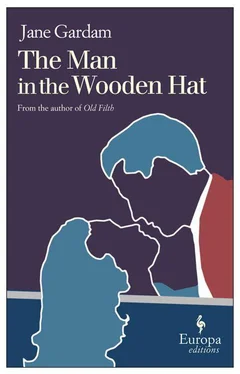Filth looked shocked. “No, no! My goodness, no. Not at all. Not glamorous .”
“I see.”
“Her — presence — is beautiful.” (It must be the glass of champagne that had been served with breakfast.) “Her soul is right.”
Ross picked up the cards. “You are not a great connoisseur of women, Edward.”
“How do you know, Coleridge? We didn’t talk about women on the Breath o’Dunoon .”
“So what about the Belfast tart?”
“I never told you that!”
“The shilling on the mantelpiece. You talked of nothing else when you were delirious with poisoned bananas.”
Filth in his magnificence pondered.
“You’d better tell Miss Macintosh the outcome.”
“How did you hear the outcome?”
“Oh, I know people.”
“Look here, I’m cured. I have a certificate. ‘VD’ they called it. Peccadilloes up there on the frontier. Old as soldiers. Old as man. Mostly curable.”
“You weren’t on the frontier. You went to bed with an Irish slag in a boarding house in Belfast.”
“I was sixteen.”
“Yes. Well. You were curiously unperturbed. I’m worried about your. .”
“What?”
“Fertility.”
“For the love of God, Ross! I’m not sure I can go on knowing you.”
“ Think , Eddie. Nobody knows you like I do.”
Below them the sun was rising from the rim of the globe. Mile-high columns of mist stood about in the air. Curtains of a giant stage. Stewardesses were clicking up the blinds letting in one bar of sunlight after another. The canned music began. Chinese music now. Ting-tang. Sleeping bodies began to stir and stretch and yawn, and Edward Feathers smiled. Looking out, so near to landing and yet so high, he waited for the first sight of the three hundred and twenty-five islands that are called Hong Kong.
On one of them Betty Macintosh would be reading his letter. He saw her smiling and skipping about. Sweet child. So young and dear and good.
What would she have made of him on the Breath o’Dunoon ? Young, ravaged, demented, shipwrecked? She’d have been a child then. He’d been a gaunt, sick boy, just left school. With an Adam’s apple. Though women had never been scarce, from the start.
Isobel.
Nowadays women looked at him as if he were a cliff face. I’m not attractive, he thought, but they’ve been told there’s a seam of gold about. Called money, I suppose.
“We’re here,” said Ross and Kai Tak airport was waiting below.
They swung round the harbour: the familiar landing pad that stuck out over the water like a diving board. During the war a plane a week had been lost there. Since then only one had tipped over into the harbour. But passengers on beginning to land always fell quiet for a moment.
“And so, Edward,” said the bright-eyed girl that night, as the red sun dropped back into the sea, “Eddie, I will,” and she took his hand. “I will. Yes. Thank you. I will and I will and I will.”
Somewhere in the archipelago her friend Lizzie would be drinking in a bar.
All morning she had been saying, “Betty — you can’t. It’d be a dreadful mistake.”
Finally, she had said, “All right. I’ll tell you something. I know him.”
“You never said! How? You know Edward?”
“See this pinhead? It’s the world. The middle classes. The Empire club. It’ll all be gone in a few years and I suppose we should be glad.”
“You know Eddie?”
“Yes. In the biblical sense, too. I was wild for him. Wild. He had this quality. I don’t know what it was. Probably still is. But you can’t forget Teddy Feathers. He doesn’t understand anyone, Bets, certainly not women. Something awful in his childhood. He’s inarticulate when he’s not in Court and then you hear another voice. As you do when he’s asleep — I know. He speaks Malay. D’you know he once had a horrible stammer? He’s a blank to everyone except that dwarf lawyer person, and there’s a mystery. Bets, you will be perfect for him as he becomes more and more boring. Pompous. Set in stone. Titled, no doubt. Rich as Croesus. But there’s something missing. Mind, he’s not sexless. He’s very enjoyable. It was before I was the other way—”
“Did you ever tell him about that?”
“Good God, no! He’d be disgusted. He leaves you feeling guilty as it is, he’s so pure. But there’s something missing. Maybe it’s his nanny — oh, Betty, don’t .”
She said, “Lizzie-Izz, you’re jealous!”
“Probably. A bit.”
All day Betty had walked about, crossing and recrossing the city, changing twice from Hong Kong to Kowloon-side. It was Sunday and she went into St. John’s Cathedral and took Communion. She got a shock when the Chinese priest changed from Cantonese to English when he administered the Bread to her. She always forgot that she was not Chinese. She walked afterwards towards Kai Tak. Planes were landing and taking off from the airport all the time. She had no idea when Eddie’s would arrive. The planes shrieked over the paper houses of the poor. The people there were said to be deaf.
Not noticing the noise, she wandered on among the filthy streets and came to a blistered building four storeys high with rubbish on every cement stair. She climbed up and up, noise bursting from each doorway and gallery, like feeding time at the zoo. The dear, remembered childhood chorus, the knockout smells of food and scraps. She clambered over boxes and bundles of rags and birdcages and parcels guarded by immobile individuals glaring at nothing. Rice bubbled thick on little stoves. On the third floor some Buddhist monks were chanting, and there was the smell of lamp oil, spices and smoke. On the top floor there was an antique English pram, inscribed Silver Cross, nearly blocking the apartment door, which her friend Amy opened when Betty knocked, a blond and rosy child on her hip and another child imminent. She had a Bible in one hand and was holding the place in it with her thumb. Schoolfriends, they hadn’t met since Amy became a missionary several years ago. She had been a dancer then.
Amy said, “Oh. Hullo, Betty Macintosh. Come on in. There’s a prayer group but there’ll be some food. Can you stay the night?” Behind her the corridor was packed with noisy people.
Inside the apartment there appeared to be no furniture except a piano where a very old Englishwoman was going hell for leather at Moody and Sankey hymns, as children of several nationalities were being fed, cross-legged on the floor. The old lady began to sing to her own accompaniment. “She’s a missionary, too,” said Amy. “But she’s got Depression. We have her round here every day in case she jumps into the harbour. She lives towards the New Territories behind barbed wire and guard dogs — she has some antiques — and does it stink!”
A chair was found. Betty sat on it and was given the baby to hold while Amy went off to dollop out rice from a black pot. The old lady stopped playing and singing and began to cry, and a different surge of wailing Buddhist chant rose from the floor below. From a sort of cupboard burst a young Englishman who ran out of the apartment, leaned over the Harrods pram on the landing and began to shout down to the monks that they could damn well give over. He was trying to work. If they wanted food, here it was, but they could stop chanting and let God have an alternative for half an hour. His Cantonese was very good. In a moment several monks in orange robes had negotiated the pram. They came into the apartment where they stood about, smiling in a row, awaiting rice.
Amy, ladle in hand, took the baby from Betty’s knee and dumped it on the knee of the Depressive. It immediately began to cry, which made the Depressive stop, and Amy, holding two dishes of rice, squeezed herself down on the floor near Betty, and said, “So?”
Читать дальше












